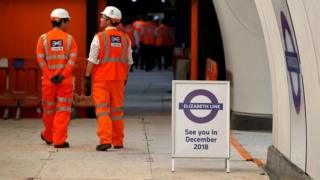 Image copyright
Image copyright
Reuters
The Elizabeth Line had been due to open in December 2018
Crossrail could be delayed until 2021, according to a senior source associated with the project to build a new railway underneath central London.
The east-west route, officially called the Elizabeth Line, will run between Reading and Shenfield in Essex and had been due to open in December 2018.
Crossrail said testing of the trains and signalling was “progressing well”.
But sources told the BBC this phase – known as dynamic testing – was “proving more difficult than was first thought”.
The source said: “It all depends on how dynamic testing goes between now and the end of this year.”
“The last quarter of this year will be a critical period for the testing.”
Signalling software
Once dynamic testing is complete then trial runs will commence. This will effectively be a simulation of the timetable in real time.
The source said, with the current state of the project in mind, a “best case scenario” would be the new Elizabeth Line opening in spring 2020.
A “middle probability case” would be the summer of next year.
“A worst case is the spring of 2021.”
Two other senior rail sources say this assessment is credible. It also tallies with one of the conclusions in a report written by MPs on the Public Accounts Committee which was published earlier this month.
However, there is still uncertainty over when the scheme can be delivered because work to match a new signalling system in the 13-mile stretch of tunnel with software on the new trains is still ongoing.
On top of the trains and signalling, all of the new stations along the route are incomplete.
Paddington and Bond Street are the furthest behind.
A delay to the project only first became public in the summer of last year, just weeks before the railway was supposed to open in December 2018.
What is Crossrail?
Image copyright
Getty Images
Crossrail is a new railway that will run beneath London from Reading and Heathrow in the west through central tunnels across to Shenfield and Abbey Wood in the east.
Construction began in 2009 and it is Europe’s biggest infrastructure project – it had been due to open in December 2018 although last summer that was pushed back to autumn 2019.
It has been officially named the Elizabeth Line in honour of the Queen and will serve 41 stations.
An estimated 200 million passengers will use the new undergound line annually, increasing central London rail capacity by 10% – the largest increase since World War Two.
Crossrail says the new line will connect Paddington to Canary Wharf in 17 minutes.
Roger Ford at Modern Railways magazine said he believed the failure to come clean about the delay was symptomatic of how politically sensitive the project was.
Both Transport for London and the Department for Transport are joint sponsors.
“It was probably a situation where people don’t report upwards for fear of getting shot.”
He said he believed “everyone is to blame” and the fact that the new management had taken several months to assess the scale of the delay “shows how bad it was”.
If there is a further significant delay it will almost inevitably cost more money.
In 2010 the budget for Crossrail was scaled back slightly to £14.8bn.
But when the initial delay became public last year that figure rose to £17.6bn.
Much of that additional money has been lent to Transport for London by the government. Whitehall officials insist London will ultimately have to cover the extra cost, not UK taxpayers elsewhere.
- Crossrail to miss December opening date
- TfL ‘removed’ Crossrail delay warnings
- Lack of accountability over Crossrail delay
In a statement, Crossrail said London needed the line to be “completed as quickly as possible and brought into service for passengers”.
“We are working very hard to finalise our new plan to deliver the opening at the earliest opportunity and we will be providing more details later this month.”
Bombardier which manufactured the trains for Crossrail did not wish to comment on reports that the testing of the trains and signalling was not going to plan.
Siemens Mobility is responsible for the signalling. When contacted by the BBC, it referred inquiries to Crossrail.
Crossrail ‘could be delayed until 2021’}

